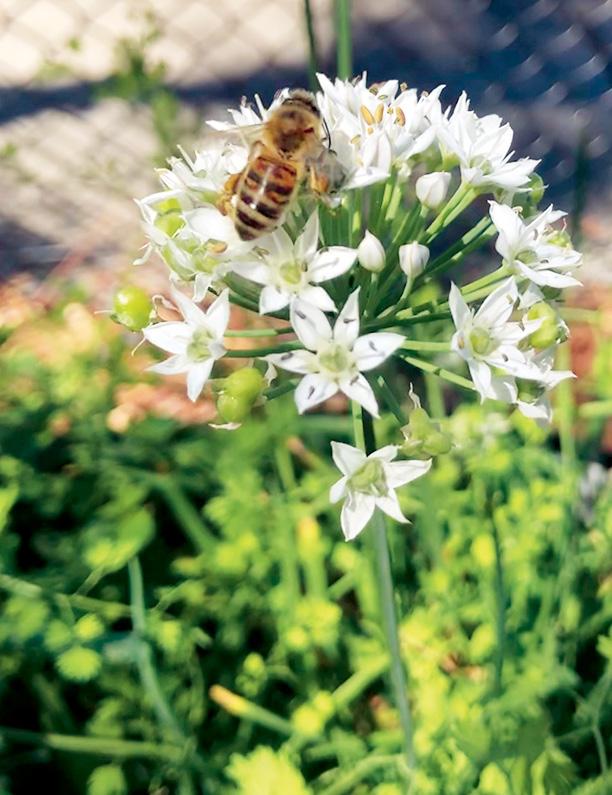
3 minute read
FeedBack Link-uP FeedBack
Dear Readers, I was interested to read in GR 276 a letter from Elaine from Mornington in Southern Victoria commenting on an observed DE c LINE IN T h E NUMBER o F BEES in her neighbourhood. Many beekeepers in Southern Victoria also noted the spring–summer season as one of the worst they have known, with cold and wet spring weather keeping bees in their boxes and hollows.
Nevertheless, in our part of the world we saw multiple swarms and I caught two myself from baited boxes at two different locations. Through feeding and disease control beekeepers can prop up the health of our colonies, but the impacts of unseasonal weather provide an insight into wider impacts that are unfolding from climate change. It really is time to curtail our more outrageous indulgences such as flying and driving unnecessarily, as well as the interminable building renovations many continue to pursue.
Advertisement
Patrick h ockey, cLUNES , V I c. Dear GR Readers,
I am sharing this information on a petition on bees from Save the Bees Australia, I think it’s important.
Gail Foster, B LA c KMANS B A y, T AS
The petition states:
Community Voice Central Coast and Save The Bees Australia demand an immediate halt to the P o IS o NING o F MILLI o NS o F NATIVE A USTRALIAN BEES through fipronil that is currently occurring in NSW under government orders.
Australia’s unique bee populations are already under threat from habitat loss, pesticide usage and effects of natural disasters. Fipronil is known to kill native bees for up to three years – this can destroy the livelihoods of our local beekeepers and spell financial ruin for their families.
The local community petitions the following:
The immediate halting and removal of fipronil baiting in NSW Red Zones.
A judicial enquiry into the relationship between government, industry funded lobby groups, and organisations representing chemical company interests, who have authority and sway over government policies related to bees.
Even native stingless bees and other nectar-feeding insects, reptiles, birds, and mammals that may visit the dead, and sprayed bee nests may get contaminated and die from fipronil poisoning.
This poison has already been banned in the UK and Europe because it kills bees. Yet the fipronil rollout has been approved by our national regulator, the Australian Pesticides and Veterinary Medicines Authority
(APVMA) who in fact receives funds from agrichemical companies.
Australia has around 1650 species of native bees that we know of, out of which three are currently recognised by the federal government as critically endangered.
Land clearing, bushfires and pesticide programs including the present fipronil baiting programs have already caused local extinction of the Green Carpenter bee species in Victoria.
There are alternatives that other countries are using –we need to invest in them now.
Native Australian stingless bees are powerful pollinators and have long been referred to as a ‘plan bee’ for crop pollination — a backstop against the loss or decline of European honeybee populations. Our bees deserve more than just being sprayed with the most toxic substances out there.
Find this petition at: www.change.org/p/halt-the-poisoning-of-native-australian-bees-through-fipronil-baiting. Dear Gardeners,
I’m pleased with myself, I made up W h ITE o IL from an old recipe I found and you might want to try it too. I poured a cup of cooking oil and one and a half cups of water into a wide mouthed jug and mixed it all up together with an egg beater. A blender is faster and easier but I don’t have one. So I beat the mixture until it looked creamy. Dilute with 50 parts water for spraying. Use for controlling sucking and chewing insects like aphids, scale, mealy bug and citrus leaf miner.
Tom Wise, c o FFS hARB o UR , NSW. Dear GR,
Readers may be interested to know that the tender young leaves of PURSLANE , Portulaca oleracea , can be added to salads. Not everyone will take to it because they may not like the texture or taste of the gluey gel that is secreted by the plant. I’m fine with it. I only use young leaves and give them a good wash first. Something a bit different and a resource many of us have. Jade, M ANSFIELD , V
Don’t forget to write the contact details you want published in the mag at the bottom of your letter!
I c.










